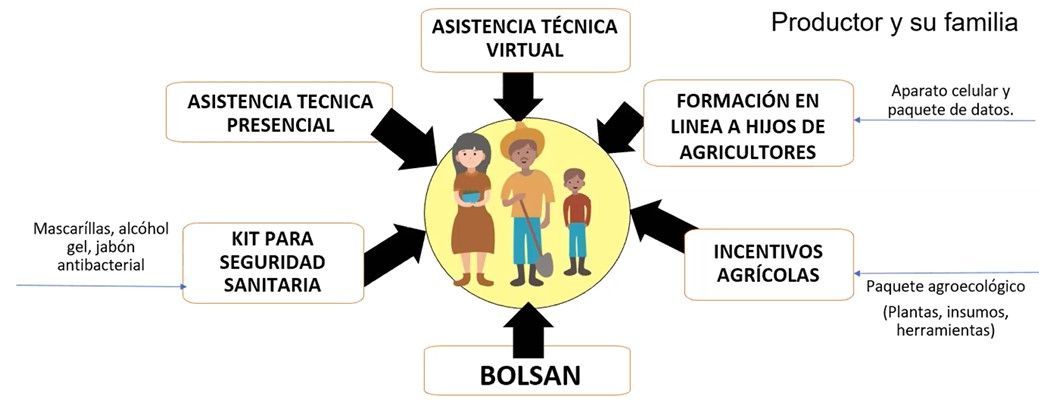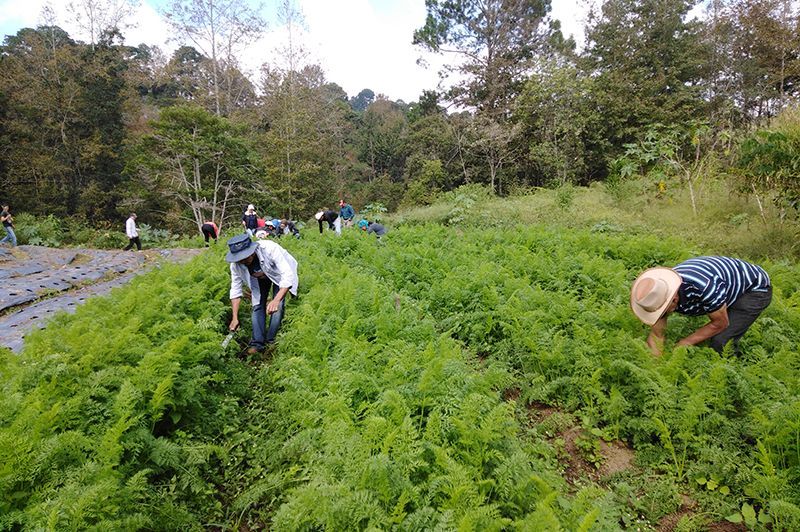The COVID-19 health crisis has posed challenges for the implementation of projects in the Resilient Food Production (RFP) sector.
Friday, June 12, Paris, France. Some answers on how to adapt the technical assistance activities of projects in the Resilient Food Production (RFP) sector at this juncture revolve around virtual training, training of resident technicians and training of trainers, promotion of alliances with local partners, and the involvement of young people.
These were the main conclusions of the virtual seminar Adjustments in the Technical Assistance of EC+ projects for the COVID 19health crisis, in which representatives of the Honduran Coffee Institute (IHCAFE), the Dutch Development Cooperation Service (SNV) and the Rio Lempa Tri-national Border Community (MTFRL) participated, sharing the operational challenges they face and how they have had to adapt their projects.
The starting point for this best practices seminar was an initial survey in which 53% of the participants stated that the communities remain closed and that they have had to limit themselves to virtual communication.
Virtual training as an approach strategy
In this regard, Sonia Bueso Mencia, from the Honduran Coffee Institute (IHCAFE) confirmed the challenges faced by the project "Coffee landscapes resilient to climate change in the tri-national area covering the dry corridor of Honduras" in which the learning methodology is the training of leaders, with field practices and replication with local producers. In the region, not only has a quarantine been decreed in, but in some locations the communities have almost totally restricted the access of personnel from outside the community.
In order move forward with the training, it has been necessary to improve connectivity conditions at the local level, as well as to strengthen the training of leaders and producers on virtual issues and to continue meetings with them through platforms such as Google Class Room and Zoom. IHCAFÉ monitors this system with registration forms that include, among other aspects, the geolocation of the participant. During this period, 298 producers have been trained, 30% of them women and 70% men.
Smart devices for the children of local producers
As for the project "Climate-smart family agriculture with an integrated watershed management approach for resilient food production in Central America", mobility restrictions, curfews and communication limitations have delayed consultancies and studies and limited training of local producers. On the other hand, the crisis has coincided with the first cycle of basic grain planting and seed production for the second cycle of the year.
Douglas Benavidez, Project Coordinator of AFCI-PARA SNV in Honduras, reported on the adjustments made to maintain the implementation of activities: in operational terms, the use of virtual means for capacity building and knowledge management has also increased; in administrative terms, the project has been extended by three months without a budget increase.
Other facilitating elements have been: that the project's technicians already reside in the territory, that the co-executor has robust social capital, having maintained synergies with other projects in the region and, above all, the training of the producers' children with smart devices so that they can act as extension agents.
Biosecurity and Information Technology Kits
In the project "Local policies and mechanisms for articulation and implementation of public-private partnerships for resilient food production in agro-food value chains in the Central American Trifinio region and Adamantina, Brazil" the situation is similar: social distancing, limited access to communities and limitations in communication have meant putting aside training with participatory methodologies that coordinate, in this case, local governments.
As an aggravating factor, communities in these regions, particularly in the Central American Trifinio, are characterized by high indices of vulnerability and food insecurity. With this in mind and in the context of a pandemic, Héctor Aguirre, General Manager of the Tri-national Border Community Rio Lempa (MTFRL) in El Salvador, commented on how a new methodological and operational strategy had to be rethought.

IMAGE 1: Promoting access to technology
This new strategy has a comprehensive approach and, as a first step, health confinement, including the delivery of biosafety kits. Also, in a similar way to previous projects, online training processes have been intensified, focusing on the children of the farmers so that they can be extension agents for the project. An agro-ecological package with inputs, plants and tools, and food bags will ensure the provision of basic services while strengthening the communities' confidence in the project.
Finally, the use of radio as another long-range information medium for everyone is taken up again.
Source: MTFRL Presentation
About EUROCLIMA+
EUROCLIMA+ is a programme financed by the European Union to promote environmentally sustainable and climate-resilient development in 18 Latin American countries, particularly for the benefit of the most vulnerable populations. The Programme is implemented under the synergistic work of seven agencies: Spanish Agency for International Development Cooperation (AECID), French Agency for Development (AFD), Economic Commission for Latin America and the Caribbean (ECLAC), Expertise France (EF), the International and Ibero-American Foundation for Administration and Public Policies (FIIAPP), the German Society for International Cooperation (GIZ), and UN Environment.
Contact information
This email address is being protected from spambots. You need JavaScript enabled to view it.
